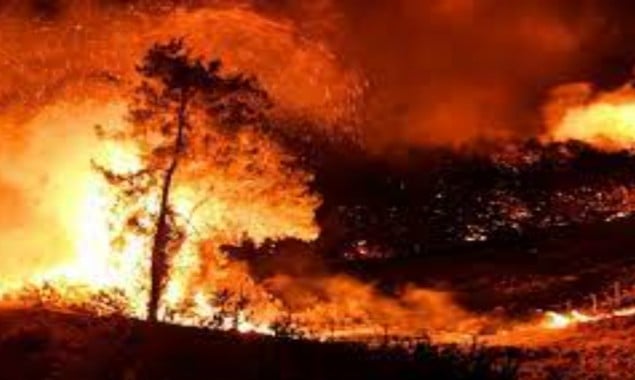Turkey Wildfire: Pakistan Extends All Possible Support
Foreign Minister Shah Mehmood Qureshi has shared condolences and support to the...

Turkey
Turkey: Fires raced through the tourist areas of Antalya and Mula, killing at least four people and causing hundreds of tourists to be evacuated from their hotels by a flotilla of boats. Conditions were tinder-dry there, as well as at the locations of dozens of other fires around the country.
According to satellite data, the heat intensity of wildfires in Turkey on Thursday was four times higher than anything on record for the nation.
The damage in Turkey adds to fear about the rising intensity of extreme weather in a climate-disrupted world, following fatal heatwaves in the Americas, floods in Europe and China, and fires in Siberia.
Popular Aegean Sea resorts were surrounded by burning hillsides, with woodland and farms turned to ash, according to local media. Despite ground and air firefighting operations, 80 hectares (197 acres) of land were burned in Bodrum, Mula province. The flames shut off two hotels, causing almost 4,000 visitors and employees to be evacuated by coastguard and fishing vessels.
During the summer, wildfires are common in Turkey, but the blazes during the past two days have been particularly severe. According to data from the EU’s Copernicus Atmosphere Monitoring Service, the heat intensity of the country’s fires reached over 20 gigawatts on Thursday, four times greater than the previous daily maximum.
Mark Parrington, a senior scientist with the EU’s Copernicus Atmosphere Monitoring Service, stated, “Those figures are off the scale compared to the past 19 years.” He said that smoke was drifting to Cyprus from fires near Antalya and Mersin.
Throughout the country, firefighters battled more than 50 blazes. Dozens were hospitalized by the fumes. As news spread, #PrayForTurkey was trending on Twitter with images of devastation and maps showing the locations of the more than two dozen fires across the country.
Recent weather, according to Turkish climate scientist Levent Kurnaz, has produced circumstances conducive to simple ignition. “The weather is extremely hot and dry. This helps to start fires. Our smallest mistake leads to great disaster,” he tweeted.
This year looks likely to continue the trend. The World Meteorological Organisation tweeted that extreme heat is hitting the wider Mediterranean region with temperatures forecast to rise well above 40C in inland areas of Italy, Greece, Tunisia, and Turkey. It has urged preparations to prevent health and water supply problems.
The heatwave in southern Europe is predicted to last far into next week, with some projections indicating that it might be one of the worst on record. The Turkish meteorological agency sees little likelihood of respite in the week ahead. Temperatures in Ankara and many other cities are expected to be more than 12 degrees Celsius higher than the August average next week.
Wildfires have already engulfed southern Greece, prompting the evacuation of communities near Patras, the westernmost port city. Bulgaria and Albania have also reported blazes. In North Macedonia, Albania, Bulgaria, and parts of Romania and Serbia, high-temperature warnings have been issued.
The EU has issued its highest fire risk alert to places in Italy, Portugal, Spain, and parts of North Africa. Further east, a large fire broke out on Thursday in Lebanon, where one person has died.
“The risk is very high right now,” Parrington said. “We could start to see more fires in the coming weeks if these temperatures continue.”
Catch all the International News, Breaking News Event and Latest News Updates on The BOL News
Download The BOL News App to get the Daily News Update & Follow us on Google News.